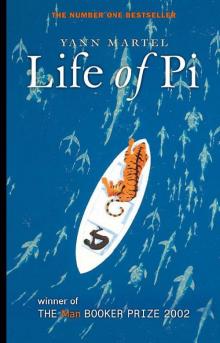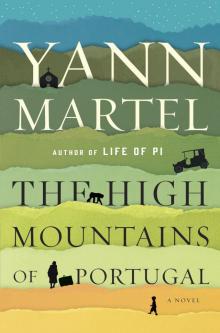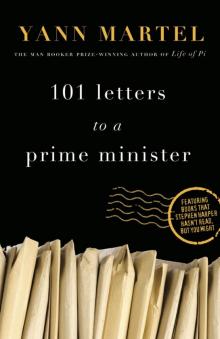- Home
- Yann Martel
The High Mountains of Portugal Page 4
The High Mountains of Portugal Read online
Page 4
"Well, now it's a producer of bad chocolate. Beautiful plantations, though."
"No doubt. By a process of deduction involving three disparate elements--the diary I've just mentioned, the logbook of a ship returning to Lisbon, and a fire in a village church in the High Mountains of Portugal--I have discovered an unsuspected treasure and located it, approximately. I'm on the brink of a great find."
"Are you? And what is this treasure, exactly?" his uncle asks, his eyes steady on Tomas.
Tomas is sorely tempted. All these months he has told no one, especially not his colleagues, about his discovery, nor even about his research. He did it all on his own time, privately. But a secret yearns to be divulged. And in mere days the object will be found. So why not his uncle?
"It is...a religious statuary, a crucifix, I believe," he replies.
"Just what this Catholic country needs."
"No, you don't understand. It's a very odd crucifix. A wondrous crucifix."
"Is it? And what does it have to do with Darwin?"
"You'll see," Tomas replies, flushing with zeal. "This Christ on the Cross has something important to say. Of that, I am certain."
His uncle waits for more, but more does not come. "Well, I hope it makes your fortune. Off we go," he says. He climbs into the driver's seat. "Let me show you how to start the engine." He claps his hands and roars, "Sabio!"
Sabio steps forward, his gaze fixed on the automobile, his hands at the ready.
"Before starting the engine, the moto-naphtha tap has to be turned to open--good man, Sabio--the throttle handle, here under the steerage wheel, has to be placed at half-admission--so--and the change-speed lever set at the neutral point, like this. Next you flick the magneto switch--here on the dashboard--to ON. Then you open the lid of the hood--there's no need to open the whole hood, you see that small lid there at the front?--and you press down once or twice on the float of the carburetor to flood it. See how Sabio does it? You close the lid, and all that's left after that is turning the starting handle. Then you sit in the driver's seat, take the hand brake off, get into first gear, and away you go. It's child's play. Sabio, are you ready?"
Sabio faces the engine squarely and sets his legs apart, feet solidly planted on the ground. He bends down and grips the starting handle, a thin rod protruding from the front of the automobile. His arms straight, his back straight, he suddenly snaps the handle upward with great force, pulling himself upright, then, upon the handle completing a half-turn, he shoves down on it, using the full weight of his body, before working the upswing as he did the first time. He performs this circular action with enormous energy, with the result that not only does the whole automobile shake but the handle spins round two, maybe three times. Tomas is about to comment on Sabio's prowess but for the result attending this spinning of the handle: The automobile roars to life. It starts with a sputtering rumble from deep within its bowels, followed by a succession of piercing explosions. As it begins to judder and shudder, his uncle yells, "Come on, hop aboard. Let me show you what this remarkable invention can do!"
Tomas unwillingly but speedily clambers up to sit next to his uncle on the padded seat that stretches across the driving compartment. His uncle does a manoeuvre with his hands and feet, pulling this and pressing that. Tomas sees Sabio straddling a motorcycle that is standing next to a wall, then kick-starting it. He will be a good man to have along.
Then, with a jerk, the machine moves.
Quickly it gathers speed and swerves out of the courtyard, throwing itself over the threshold of the opened gates of the Lobo estate onto Rua do Pau de Bandeira, where it does a sharp right turn. Tomas slides across the smooth leather of the seat and slams into his uncle.
He cannot believe the bone-jarring, mind-unhinging quaking he is experiencing, directly related to the noise-making, because such trembling can come only from such noise. The machine will surely shake itself to pieces. He realizes he has misunderstood the point of the suspension springs his uncle mentioned. Clearly their purpose is not to protect the automobile from ruts, but ruts from the automobile.
Even more upsetting is the extremely fast and independent forward motion of the device. He sticks his head out the side and casts a look backwards, thinking--hoping--that he will see the Lobo household, every family member and employee, pushing the machine and laughing at the joke they are pulling on him. (Would that Dora were among those pushers!) But there are no pushers. It seems unreal to him that no animal should be pulling or pushing the device. It's an effect without a cause, and therefore disturbingly unnatural.
Oh, the alpine summits of Lapa! The automobile--coughing, sputtering, rattling, clattering, jouncing, bouncing, chuffing, puffing, whining, roaring--dashes down to the end of Rua do Pau de Bandeira, the cobblestones underfoot making their presence known with a ceaseless, explosive rat-a-tat, then violently lurches leftwards and falls off the street as if from a cliff, such is the steepness of Rua do Prior. Tomas's guts feel as if they are being squeezed into a funnel. The automobile reaches the bottom of the street with a flattening that sends him crashing to the floor of the driving compartment. The machine has barely stabilized itself--and he regained his seat, if not his composure--before it springs up the last upward part of Rua do Prior onto Rua da Santa Trindade, which in turn descends steeply. The automobile gaily starts to dance over the metallic jaws of Santa Trindade's tram tracks, sending him sliding to and fro across the seat, alternately smashing into his uncle, who does not seem to notice, or practically falling out of the automobile at the other end of the seat. From balconies that fleet by, he sees people scowling down at them.
His uncle takes the right turn at Rua de Sao Joao da Mata with ferocious conviction. Down the street they race. Tomas is blinded by the sun; his uncle seems unaffected. The automobile pounces across Rua de Santos-o-Velho and bolts down the curve of Calcada Ribeiro Santos. Upon reaching the Largo de Santos, he looks wistfully--and briefly--at the walkers indulging in the slow activities of its pleasant park. His uncle drives around it until, with a savage left turn, he flings the automobile onto the wide Avenida Vinte e Quatro de Julho. Lapa's lapping waters, the breathtaking Tagus, open up to the right in a burst of light, but Tomas does not have time to appreciate the sight as they hurtle through the urban density of Lisbon in a blur of wind and noise. They spin so fast around the busy roundabout of Praca do Duque da Terceira that the vehicle is projected, slingshot-like, down Rua do Arsenal. The hurly-burly of the Praca do Comercio is no impediment, merely an amusing challenge. Indistinctly Tomas sees the statue of the Marquis of Pombal standing in the middle of the square. Oh! If only the Marquis knew what horrors his streets were being subjected to, he might not have rebuilt them. On they go, onward and forward, in a roar of rush, in a smear of colour. Throughout, traffic of every kind--horses, carts, carriages, drays, trams, hordes of people and dogs--bumble around them blindly. Tomas expects a collision at any moment with an animal or a human, but his uncle saves them at the last second from every certain-death encounter with a sudden swerve or a harsh stoppage. A number of times Tomas feels the urge to scream, but his face is too stiff with fright. Instead, he presses his feet against the floorboards with all his might. If he thought his uncle would accept being treated like a life buoy, he would gladly hold on to him.
All along, his uncle--when he is not hurling insults at strangers--is lit up with joy, his red face radiating excitement, his mouth creased up in a smile, his eyes shining, and he laughs with insane abandon, or shouts a one-way conversation of acclamations and exclamations: "Amazing!...Glorious!...Fantastic!...Didn't I tell you?...Now, that's how you take a left turn!...Extraordinary, absolutely extraordinary!...Look, look: We must be hitting fifty kilometres an hour!"
Meanwhile, the Tagus flows, placid, unhurried, unperturbed, a gentle behemoth next to the outrageous flea that leaps along its bank.
Next to a field, upon a fledgling rural road without any cobblestone finery, his uncle at last stops the automobile. Behind them, at s
ome distance, Lisbon's skyline stands, like the emerging teeth of a small child.
"See how far we've come--and so fast!" His uncle's voice booms in the refreshing silence. He is beaming like a boy on his birthday.
Tomas looks at him for a few seconds, incapable of speech, then practically falls to the ground getting out of the driving compartment. He staggers to a nearby tree and supports himself against it. He bends forward and a heaving gush of vomit spews from his mouth.
His uncle shows understanding. "Motion sickness," he diagnoses breezily as he removes his driving gloves. "It's a curious thing. Some passengers are subject to it, but never the driver. Must be something to do with controlling the vehicle, perhaps being able to anticipate the coming bumps and turns. That, or the mental effort of driving distracts the stomach from any malaise it might feel. You'll be fine once you're behind the wheel."
It takes a moment for Tomas to register the words. He cannot imagine holding the reins of this metallic stallion. "Sabio is coming with me, isn't he?" he asks breathlessly as he wipes the sides of his mouth with his handkerchief.
"I'm not lending you Sabio. Who will look after my other vehicles? Besides, he's made sure the Renault is in tip-top running order. You won't need him."
"But Sabio will drive the thing, Uncle."
"Drive it? Why would you want that? Why would anyone want to delegate to a servant the thrill of driving such an astonishing invention? Sabio is here to work, not to play."
Just then the servant in question appears, expertly directing the sputtering motorcycle off the road to stop it behind the automobile. Tomas turns to his uncle again. It's his blistering ill fortune to have a relative with the wealth to own several automobiles and the eccentricity to want to drive them himself.
"Sabio drives you around, dear Uncle."
"Only on formal occasions. It's mostly Gabriela he carts about. Silly mouse doesn't dare try it herself. You're young and smart. You'll do fine. Won't he, Sabio?"
Sabio, who is standing quietly next to them, nods in agreement, but the way his eyes linger on Tomas makes Tomas feel that he does not fully share his employer's sunny trust. Anxiety roils his stomach.
"Uncle Martim, please, I have no experience in--"
"Look here! You start in neutral, with the throttle at half. To get going, you put yourself in first gear, then release the clutch slowly as you press on the accelerator pedal. As you gather speed, you move up to second gear, then third. It's easy. Just start on flat ground. You'll get the knack in no time."
His uncle steps back and fondly contemplates the automobile. Tomas hopes that during this pause, kindness and solicitude will soften his uncle's heart. Instead, he delivers a last blast of peroration.
"Tomas, I hope you are aware that what you have before your eyes is a highly trained orchestra, and it plays the most lovely symphony. The pitch of the piece is pleasingly variable, the timbre dark but brilliant, the melody simple yet soaring, and the tempo lies between vivace and presto, although it does a fine adagio. When I am the conductor of this orchestra, what I hear is a glorious music: the music of the future. Now you are stepping up to the podium and I am passing you the baton. You must rise to the occasion." He pats the driver's seat in the automobile. "You sit here," he says.
Tomas's lungs are suddenly gasping for air. His uncle gestures to Sabio to start the engine. Once again the roar of the internal combustion engine fills the exterior countryside. He has no choice. He has waited too long, understood too late. He will have to get behind the steerage wheel of the monster.
He climbs aboard. His uncle again points, explains, nods, smiles.
"You'll be all right," he concludes. "Things will work out. I'll see you when you return, Tomas. Good luck. Sabio, stay and help him out."
With the finality of a door slamming, his uncle turns and disappears behind the automobile. Tomas cranes his head out the side to find him. "Uncle Martim!" he shouts. The motorcycle starts with a detonation, followed by a grinding sound as it moves off. His last view of his uncle is the sight of his ample girth overhanging both sides of the slender machine and his disappearance down the road in a thunder of mechanical flatulence.
Tomas turns his eyes to Sabio. It occurs to him that his uncle has departed on the motorcycle and that he is to leave with the automobile. How then will Sabio return from the outer northeast edge of Lisbon to his employer's house in western Lapa?
Sabio speaks quietly. "Driving the automobile is possible, senhor. It only needs a little practice."
"Of which I have none!" Tomas cries. "Neither practice nor knowledge, neither interest nor aptitude. Save my life and show me again how to use this blasted thing."
Sabio goes over the daunting details of piloting the manufactured animal. He instructs with untiring patience, spending much time over the proper order in which to press or release the pedals and pull or push the levers. He reminds Tomas about the left and right turning of the steerage wheel. He teaches him the use of the throttle handle, which is needed not only to start the engine but to stop it. And he speaks on matters Uncle Martim said nothing about: the difference between pressing hard or lightly on the accelerator pedal; the usage of the brake pedal; the important hand brake, which he is to pull whenever the automobile is at rest; the use of the side mirrors. Sabio shows him how to turn the starting handle. When Tomas tries it, he feels something heavy turning inside the automobile, like a boar on a spit being rotated in a vat of thick sauce. On his third turn of the spit, the boar explodes.
He stalls the engine again and again. Each time Sabio gamely returns to the front of the machine, where he gets it to roar to life again. Then he proposes to put the machine into first gear. Tomas slides over to the passenger side of the driving compartment. Sabio does the necessary manoeuvres; the gears sigh consent and the machine inches forward. Sabio points to where he should put his hands and where he should press his foot. Tomas moves into place. Sabio works his way out of the driver's seat onto the footboard, nods gravely at him, and steps off the automobile.
Tomas feels cast off, thrown away, abandoned.
The road ahead is straight and the machine grunts along noisily in first gear. The steerage wheel is a hard, unfriendly thing. It shakes in his hands. He tugs it one way. Is it left? Is it right? He can't tell. He's barely able to make it move. How did his uncle do it so easily? And keeping the accelerator pedal pressed down is exceedingly tiresome; his foot is starting to cramp. At the first bend, a slight curve to the right, as the automobile starts to cross over the road and head towards a ditch, alarm pushes him to action and he lifts his foot and stamps on one pedal after another at random. The machine coughs and jolts to a halt. The clanging pandemonium mercifully stops.
Tomas looks about. His uncle is gone, Sabio is gone, there is no one else in sight--and his beloved Lisbon is gone too, scraped away like the leftovers of a meal off a plate. Into a silence that is more vacuum than repose, his little son vaults into his mind. Gaspar often ventured out to play in the courtyard of his uncle's house before being shooed away by one servant or another, like a stray cat. He also prowled about the garage, filled as it was with rows of bicycles and motorcycles and automobiles. His uncle would have found a kindred spirit in his son when it came to motoring. Gaspar stared at the automobiles like a hungry mouth eats. Then he died, and the courtyard now contains a silent parcel of emptiness. Other parts of his uncle's house similarly afflict Tomas with the absence of Dora or of his father, this door, that chair, this window. What are we without the ones we love? Would he ever get over the loss? When he looks in his eyes in the mirror when he shaves, he sees empty rooms. And the way he goes about his days, he is a ghost who haunts his own life.
Weeping is nothing new to him. He has wept many, many times since death dealt him a triple blow. A remembrance of Dora, Gaspar, or his father is often both the source and the focus of his grief, but there are times when he bursts into tears for no reason that he can discern, an occurrence as random as a sneeze. The situation
now is clearly very different in nature. How can a noisy, uncontrollable machine and three coffins be compared in their effect? But strangely he feels upset in the same way, filled with that same acute sense of dread, aching loneliness, and helplessness. So he weeps and he pants, grief in competition with simmering panic. He pulls out the diary from his jacket pocket and presses it to his face. He smells its great age. He closes his eyes. He takes refuge in Africa, in the waters off its western equatorial coast, on the Portuguese island colony of Sao Tome. His grief seeks the man who is leading him to the High Mountains of Portugal.
He tried to find information on Father Ulisses Manuel Rosario Pinto, but history seemed to have forgotten him nearly entirely. There was no trace of him but for two dates that gave his unfinished outlines: his birth on July 14, 1603, as attested by the Sao Tiago parish registry in Coimbra, and his ordination as a priest in that same city in the Cathedral of the Holy Cross on May 1, 1629. No other detail of his life, down to the date of his death, could Tomas find. All that remained of Father Ulisses in the river of time, pushed far downstream, was this floating leaf of a diary.
He pulls the diary away from his face. His tears have marred its cover. This does not please him. He is professionally annoyed. He dabs at the cover with his shirt. How strange, this habit of weeping. Do animals weep? Surely they feel sadness--but do they express it with tears? He doubts it. He has never heard of a weeping cat or dog, or of a weeping wild animal. It seems to be a uniquely human trait. He doesn't see what purpose it serves. He weeps hard, even violently, and at the end of it, what? Desolate tiredness. A handkerchief soaked in tears and mucus. Red eyes for everyone to notice. And weeping is undignified. It lies beyond the tutorials of etiquette and remains a personal idiom, individual in its expression. The twist of face, quantity of tears, quality of sob, pitch of voice, volume of clamour, effect on the complexion, the play of hands, the posture taken: One discovers weeping--one's weeping personality--only upon weeping. It is a strange discovery, not only to others but to oneself.
Resolve surges in him. There is a church in the High Mountains of Portugal waiting for him. He must get to it. This metal box on wheels will help him do that, and so sitting behind its controls is where he should be. Isso e minha casa. This is home. He looks down at the pedals. He looks at the levers.

 Beatrice and Virgil
Beatrice and Virgil Life of Pi
Life of Pi Self
Self The High Mountains of Portugal
The High Mountains of Portugal 101 Letters to a Prime Minister
101 Letters to a Prime Minister